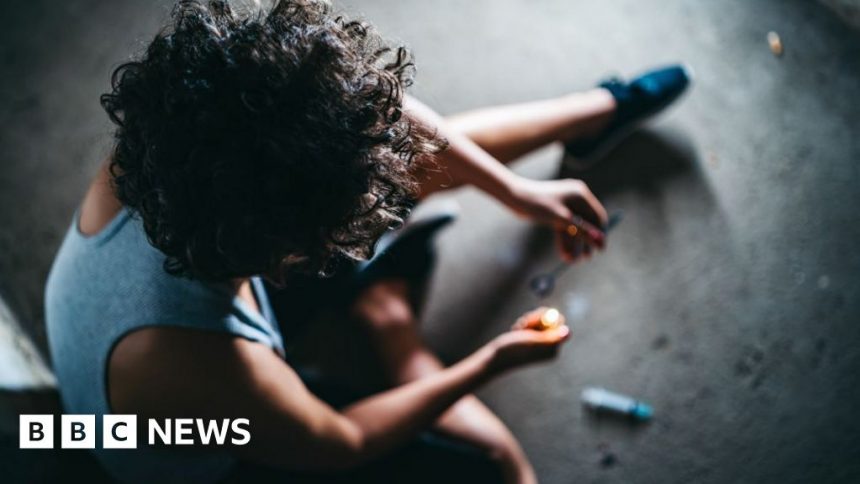Hunter Biden’s addiction was laid bare, highlighting a national problem
 Getty Images
Getty ImagesWilliam C Moyers knows something about Hunter Biden’s journey.
As a younger man, he was addicted to crack cocaine and went through treatment to recover with the support of his family.
Now he advocates to help others follow the same path as vice-president of public affairs at Hazelden Betty Ford Foundation, named after a former first lady.
When a Delaware jury found the US president’s son guilty of three felony charges linked to his drug addiction, Mr Moyers saw a chance to highlight a common problem in the US – affecting an uncommon family.
“Hunter Biden’s story is a story that all too many Americans know intimately,” he said.
“It’s a good thing if, at the end of the day, we shift our conversations and our focus away from just piling on, and instead recognise that addiction is a public health crisis and that recovery is possible.”
In 2022, nearly 49 million Americans aged 12 and older struggled with a substance abuse disorder in the past year, according to the US National Survey on Drug Use and Health.
And about a third of Americans knew someone who died of a drug overdose, according to a study published in medical journal JAMA in March.
Federal prosecutors charged Hunter Biden for lying about his drug use on a form to obtain a gun in October 2018.
- Guilty on all charges. Will Hunter Biden go to prison?
- Jurors say politics did not sway verdict
- What son’s conviction means for President Biden
He pleaded not guilty and his attorneys argued he was not using drugs when he answered “no” on paperwork asking if he was using or addicted to unlawful substances. On Tuesday, a jury found Biden guilty after about three hours of deliberations.
Never before had a sitting president’s child faced a felony conviction. Yet Biden’s case over several days showed not even America’s first family is immune to addiction, and highlighted a battle millions face across the US.
“Every family, whether you’re coastal or in the American heartland, probably has a family member or an extended family member who [has] a substance use disorder,” said Dr Lucas Trautman, medical director at a chapter of American Addiction Centers in Mississippi.
But the trial re-aired embarrassing details about Biden’s life during his period of addiction, previously used as fodder by his father’s critics.
Some images if used as political weapons could have a negative impact.
“We’re constantly trying to destigmatise substance use treatment, so that people come forward,” said Dr Trautman.
- BBC reporter describes Hunter Biden’s reaction to verdict
- Hunter Biden – a life of troubles and scandals
“Any time we use a public figure who has a substance abuse disorder for political gain and paint them in a nefarious light, it could stigmatise other people suffering from addiction.”
The trial focused on a dark chapter in Hunter Biden’s life: his descent into drug addiction following the death of his older brother, Beau, in 2015. He says he has been in recovery for about five years.
Jurors saw graphic images of him with drug paraphanalia and heard audio excerpts from his memoir, Beautiful Things, describing this period.
“After my uncle died, things got bad,” Hunter Biden’s daughter, Naomi, testified during the trial, choking back tears.
Prosecutors showed a text message from Biden in which he described “sleeping on a car smoking crack”.
Some advocates argue that the brutal depiction unveiled in the high-profile trial could lead to more beneficial conversations around addiction and accountability.
“We need to get substance use out in the public, people talking about it, and developing the policies and strategies and tools put in place to holistically help people,” said Pat Aussem, vice president at Partnership to End Addiction who works on programmes for families.
There are precedents for America’s first families forever changing – and improving – the conversation around addiction.
As the trial reached its conclusion this week, Patti Davis, daughter of late former president Ronald Reagan, published a New York Times op-ed detailing her own struggles with substance abuse and the unique pressure of recovery as a member of the first family.
“Families of presidents have struggled with substance use issues forever,” said Mr Moyers, who works with the clinics founded by first lady Betty Ford, who challenged taboos when she came forward about her struggles with substance abuse in the 1970s.
“In this era and age of hyperfocus on social media, I think the debate and conversation are more intense now than ever,” he said.







